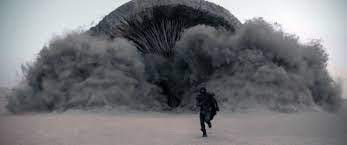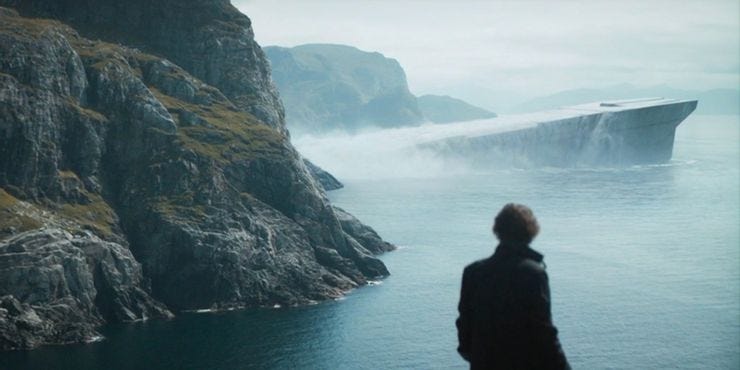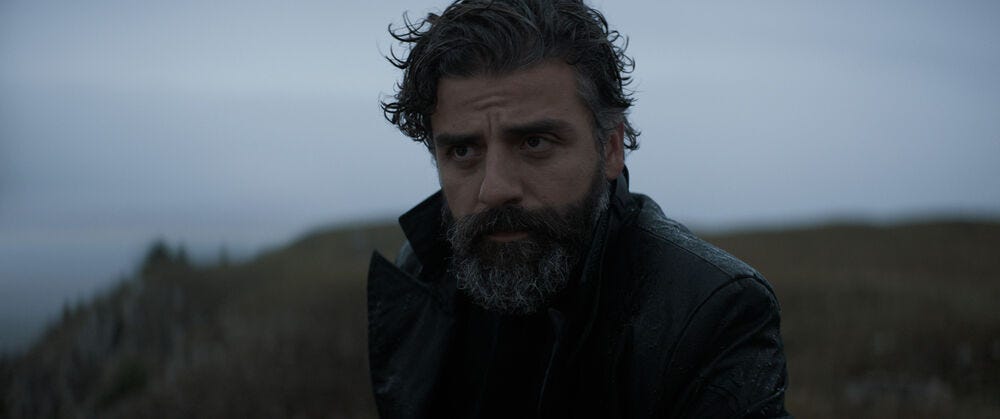Structures of Power in Villeneuve’s "Dune"
It’s been hard to not notice the ramp-up to Denis Villeneuve’s Dune. Not Since Wes Anderson announced Isle of Dogs has a non-superhero, non-Frozen II movie garnered so much pre-release hype. And after the movie came out, it was a little tricky to navigate the internet without running into a Dune spoiler. I didn’t get to see the film until a few days ago, because—I’m not a professional critic! I don’t get invited to advance screenings, so I have to wait until the film shows in theaters and I have an evening free before I can see it. Well, now I saw it. Perhaps one of the perks of being a late reviewer is that I can drop spoilers with impunity?
I’m brand-new to Dune. Never read the books, never saw the 1984 David Lynch adaptation, and my social circle includes very few people who read Frank Herbert’s original novel. If pressed, I could have probably given a three-sentence-long quick summary of the Dune universe and backstory, from things I picked up while existing on the fringes of nerd culture. I was worried that the movie would be incomprehensible without some familiarity with the books; this is not the case. The film did remarkably well at explaining itself to a neophyte, although there were many aspects which I couldn’t understand—perhaps the most glaring is that the film never tells the viewer that computers are nonexistent, and have even been outlawed, in the Duniverse; the most confusing is when Duke Leto tells Jessica, “I should have married you”. Although the movie is a coherent and fully-formed story on its own, reading a few Wikipedia articles after watching it is a definite help in understanding some of its details.
Some people have pointed out the importance of religion in Frank Herbert’s books; others have focused on its themes of colonialism, or its coming-of-age story. I want to draw out the implications of the power theme in Villeneuve’s imagining of Dune. (Before I go any further, I should say once more that I have not read the books, so any interpretations of characters comes only from my watching the movie.)
What is power? The ability to control things? To manipulate your surroundings? A bomb dropping on the Atreides compound is one form of power; so is the Bene Gesserit order’s centuries-long genetic selection program. Power takes many forms in Dune, and almost every significant character exercises power in some way. The plot is a network of interweaving and interlocking structures of power—the Imperium is at odds with the noble houses, and tries to lessen their strength; House Atreides and House Harkonnen are at war with each other; the Bene Gesserit seem to exercise some sort of shadowy behind-the-scenes power over the entire universe; and the Atreides house exists in an existential struggle with the environment on Arrakis—unlike the Fremen, who survive in the harsh environment by skillfully employing the “desert power” which Duke Leto Atreides covets. It is notable, however, that most of time, the characters of Dune do not use their power for individualistic purposes—they almost exclusively act in service to something bigger than themselves, to a goal shared with a larger group. In the film, the exception to this rule is Jessica, who gave birth to a son against the wishes of the Bene Gesserit order of which she is part.
Power, used for a purpose, has close affinities with the concept of stewardship. True stewardship—exercising control over an asset or resource on behalf of someone else—is an important Biblical concept, but it is not encountered often in contemporary society. In Dune, the planet of Arrakis and its all-important spice industry are given by the Emperor in fief to House Atreides. This kind of stewardship might be hard for a 21st-century viewer to understand, but enough medieval history is known in general that the idea of holding something in fief doesn’t require too much explanation. Another idea, which may be even more foreign to modern audiences’ lived experience, is that of a strong family government, so strong as to be a threat to the civil government’s authority and prerogatives. Again, this kind of power was much more common in the middle ages. Recent talk of Facebook and Amazon getting seats at the United Nations indicates how modern-day corporations can have a similarly destabilizing effect, but what would it look like, today, if families were to wield so much power that civil governments got scared of them?
It is notable that Duke Leto Atreides has only one child. Are certain family structures more conducive than others to the wielding of long-term power? In their excellent book Red Families vs. Blue Families, Naomi Cahn and June Carbone detail how the two dominant patterns of familial life in America either promote or inhibit various possibilities, outcomes, and approaches to cultural involvement. The Atreides house is conforming to Cahn and Carbone’s “blue” family structure in having only one heir, and investing heavily in that heir’s future possibilities of success through a comprehensive program of education. But the “red” family, which prioritizes relationships and support networks over wealth-building and cultural influence, has a similar chance of becoming significantly powerful over the long term—however, that power will most likely be deployed in a different fashion. Any financial resources the “red” family might have will be diluted by being apportioned among numerous siblings; if significant power is achieved, internecine fighting might be the result (witness England’s Wars of the Roses in the 14th century).
With that in mind, the scene where Paul almost renounces his claim to the lineage of House Atreides is even more poignant. I’m sure everyone who has worked their whole life to give something to their children has the nagging doubt that their gift might not be wanted. How does Leto handle the situation, when Paul leaves open the possibility that he might abandon the family agenda?
If there is only one potential heir, and if that heir gives up the family power, all that the family has been working for—for generations, sometimes—will be lost. This scene is where Duke Leto Atreides shows his true strength: if he was merely lusting for power, his son’s ambivalence would have been deeply unsettling. But he is only interested in proper stewardship of what has been entrusted to him; as a good steward, he knows that the power he holds is not really his (in contrast, Baron Vladimir Harkonnen shows that he is not a good steward by trying to hold onto the fiefdom of Arrakis after the Emperor entrusts the planet to the House Atreides). Duke Leto tells his son, “a great man doesn’t seek to lead. He’s called to it, and he answers. And if your answer is no, you’ll still be the only thing I ever needed you to be: my son.” In saying this, Duke Leto shows that he, himself, is one of those great men. He doesn’t only posses power (the ability to control others); he also has strength—the ability to control himself.
I’m not in touch with the fandom enough to know if Denis Villeneuve’s version of Dune will be the one that sticks around and becomes part of the canon of great sci-fi films, but I do know that, despite being more than 150 minutes long, it did not feel ponderous or dragged-out. Watching the movie in the theater was the kind of experience that makes me believe theater-going will never die. The film is full of amazing visuals, at times beautiful, at times threatening. And Hans Zimmer’s score, based mostly on wordless vocals with electronic washes, tops it all off superbly. The film ends on a mild cliffhanger, with many questions unanswered. Will we have to wait three years for Dune 2, just as Star Wars fans had to wait three years to find out if Vader was telling the truth about being Luke’s father? Or will we only have to wait 72 days, as filmgoers in Denmark did before watching The Girl Who Kicked The Hornet’s Nest? I don’t know, but I will certainly be back to watch the Dune sequel. And in between, I’ll try to read the book.
If you want to read more about Dune, here are three pieces which you might enjoy. Max Read wrote a humorous and lovingly attentive annotation of the film. Alissa Wilkinson wrote, here, about the story’s prevalence in the broader culture and what gives it staying power. And in this interview, Scott Tobias and John Hodgman discuss the differences between Lynch’s and Villeneuve’s conceptions of Dune, and make some very worthwhile points about the story’s “white savior” motif. I hope you enjoy!
As always, thank you for reading. I welcome any comments or suggestions you might have; you can reply directly to this email if you don’t want to go public in the comments box below. If you thought this review was worth your time reading, please consider sharing with a friend using the big red button underneath this text. And if you aren’t yet subscribed, doing so is as easy as ripping napkins! Thanks again!





